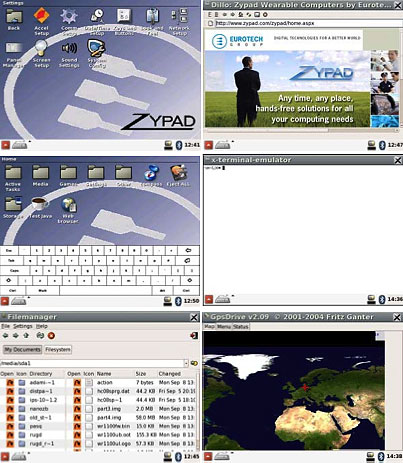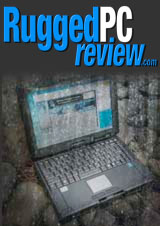Parvus Corporation, headquartered in Salt Lake City, Utah, is a U.S. subsidiary of the Eurotech Group, a global family of technology companies focused on innovative embedded and high performance computing solutions. They have been a strategic systems engineering and development partner for aerospace, defense, transportation, and industrial OEMs for over 25 years. Parvus specializes in the rapid design and production of turnkey embedded computing solutions for harsh environments.
 Parvus introduced the Zypad WR1100 in late 2008 as a rugged mobile wearable computer for harsh environments. Wearable computers have long captivated the imagination of mobile users, but most designs did not prove to be feasible. Parvus parent Eurotech, however, took a new look at wrist-worn computers and first designed the Zypad WL1000 and now the Zypad WL1100 and its ruggedized version, the Zypad WR1100. The goal was to provide standard computer functionality and power, but with the hands-free convenience of a wrist-worn instrument. This approach has proven successful in the scuba diving industry where legions of divers wear their ultra-reliable dive computers on their wrists.
Parvus introduced the Zypad WR1100 in late 2008 as a rugged mobile wearable computer for harsh environments. Wearable computers have long captivated the imagination of mobile users, but most designs did not prove to be feasible. Parvus parent Eurotech, however, took a new look at wrist-worn computers and first designed the Zypad WL1000 and now the Zypad WL1100 and its ruggedized version, the Zypad WR1100. The goal was to provide standard computer functionality and power, but with the hands-free convenience of a wrist-worn instrument. This approach has proven successful in the scuba diving industry where legions of divers wear their ultra-reliable dive computers on their wrists.
Technologically, the Zypad WR1100 is based on the 416MHz version of the Marvell PXA270 processor. It comes with 256MB of RAM and 128MB of Flash. The touch screen measures a large 3.5 inches diagonally (the same as the iPhone), and features full 480 x 640 pixel VGA resolution and a brightness sensor. Operation is via touch, a small stylus and/or buttons (Esc/Cancel, Enter, 4 software-programmable function keys). There is even a small 4-way cursor control pad.
There is a microSD card slot for expansion as well as an add-on expansion module system. The Lithium-Polymer modular battery pack is hot-swappable. The device has a speaker, a microphone with noise cancellation, an audio port, and both USB host and client ports. There is also an integrated accelerometer and biometric fingerprint reader. The accelerometer does useful things such as turning the backlight off when detecting the user's arms hanging down.
While the company's WL1000 uses Windows CE, the WR1100 runs a special version of Linux based on Kernel 2.6. You get a standard desktop with folders and icons, and anyone familiar with Linux will instantly feel at home. There is a web browser, a file manager, an input panel with keyboard, numerous utilities, an X-terminal emulator, GPS, and numerous other apps. Below are some of the screens. In reality, they are razor-sharp at 640 x 480 resolution).

In terms of communication, the Zypad has integrated Bluetooth and 802.11b/g WiFi. It is also possible to add a 12-channel DGPS receiver or a GSM/GPRS/EDGE/UMTS voice/data module, or one that combines both functions.
As far as ruggedness goes, the Zypad WR1100 can handle pretty much anything coming its way. It carries IP67 sealing, which means it's dust and waterproof. It can also handle 4-foot drops (and likely more), has an extreme -4 to 140 Fahrenheit operating temperature range, and has been MIL-STD-810F tested in several other areas. The housing is made of Fiberglass-reinforced nylon over a magnesium alloy interior. Weight might be a bit of a concern as the Zypad weighs a full 1.65 pounds. You feel that, but it's manageable.
What all this means is that Parvus offers essentially a fully functional and well-connected Linux system that you carry on your wrist. Application potential is fairly unlimited, and there should be considerable interest in this device in any number of industries as well as the government and military.



